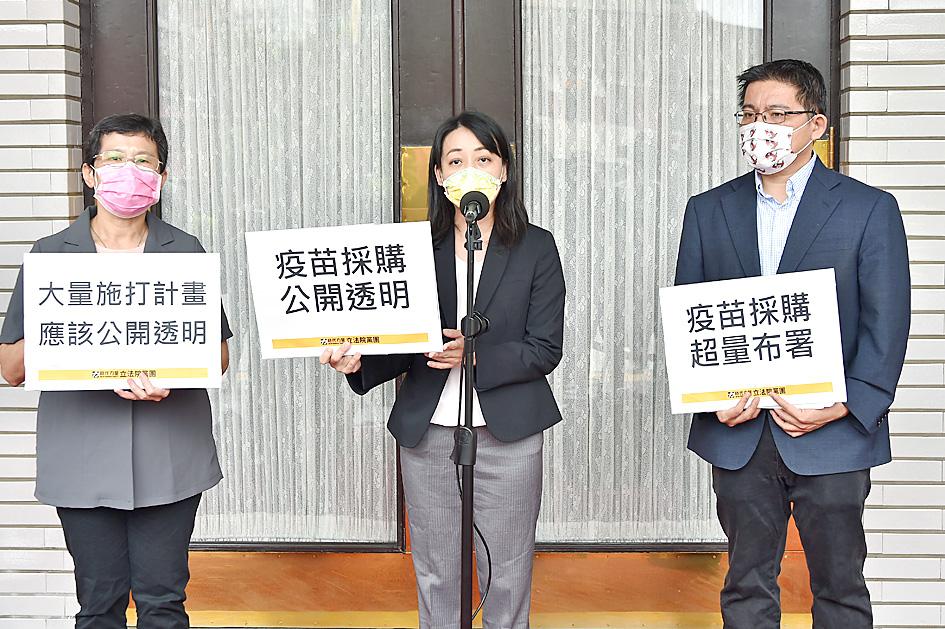President Tsai Ing-wen (蔡英文) should personally lead the fight against the COVID-19 pandemic so that personnel and resources can be made available quickly to those in need, New Power Party (NPP) lawmakers said in a statement yesterday.
NPP legislators Chiu Hsien-chih (邱顯智), Claire Wang (王婉諭) and Chen Jiau-hua (陳椒華) issued the statement as the nation grapples with a COVID-19 outbreak caused by multiple cluster infections that occurred early last month.
Hospitals, particularly those in Taipei and New Taipei City, have said that their personnel and resources have been stretched thin due to a surge in the number of critically ill COVID-19 patients.

Photo: Tu Chien-jung, Taipei Times
“The current chain of command can no longer bear the heavy responsibility of fighting the war against the pandemic. In other countries, it is the president or prime minister who fully takes charge on the front line of the battle,” they said.
“President Tsai should assume command so that all personnel and resources can be quickly directed to people in need,” they added.
In the past, the private sector was allowed to procure vaccines directly from international pharmaceutical companies and donate them to the government, and the government offered assistance during procurement to make sure that the vaccines are safe, the party said.
Such cooperation today would not only serve as the best example of public-private partnership, but would also ensure the quality of vaccines, as well as the health and safety of the public, it added.
“Since last year, the government’s endeavors in purchasing vaccines have been blocked by political reasons. Should the government insist that it, rather than donors, sign contracts with pharmaceutical firms, it will only experience repeated setbacks,” the NPP said.
Tsai should welcome all efforts from the private sector to overcome political obstacles to secure vaccines, which should not include those produced in China, it said.
People who are inoculated with COVID-19 vaccines should be covered by the nation’s vaccine injury compensation system, regardless of whether they received vaccines purchased by the government or the private sector, it added.
The party also asked why the Ministry of Health and Welfare was in a hurry to sign contracts with local firms Medigen Vaccine Biologics and United Biomedical to preorder a total of 10 million vaccine doses, even though the vaccines have yet to complete phase 2 clinical trials.
The announcement has given people the impression that the government insists on buying domestic vaccines, regardless of the trial results, it said.
The ministry should explain to the public the grounds for its decision, the party said.
“We should not bet our lives on domestic vaccines with unverified trial results,” it said.
The government should focus on collaborating with the private sector to acquire vaccines that have been certified as safe to use, and then quickly administer them to the public, the party added.

The brilliant blue waters, thick foliage and bucolic atmosphere on this seemingly idyllic archipelago deep in the Pacific Ocean belie the key role it now plays in a titanic geopolitical struggle. Palau is again on the front line as China, and the US and its allies prepare their forces in an intensifying contest for control over the Asia-Pacific region. The democratic nation of just 17,000 people hosts US-controlled airstrips and soon-to-be-completed radar installations that the US military describes as “critical” to monitoring vast swathes of water and airspace. It is also a key piece of the second island chain, a string of

A magnitude 5.9 earthquake that struck about 33km off the coast of Hualien City was the "main shock" in a series of quakes in the area, with aftershocks expected over the next three days, the Central Weather Administration (CWA) said yesterday. Prior to the magnitude 5.9 quake shaking most of Taiwan at 6:53pm yesterday, six other earthquakes stronger than a magnitude of 4, starting with a magnitude 5.5 quake at 6:09pm, occurred in the area. CWA Seismological Center Director Wu Chien-fu (吳健富) confirmed that the quakes were all part of the same series and that the magnitude 5.5 temblor was

The Central Weather Administration has issued a heat alert for southeastern Taiwan, warning of temperatures as high as 36°C today, while alerting some coastal areas of strong winds later in the day. Kaohsiung’s Neimen District (內門) and Pingtung County’s Neipu Township (內埔) are under an orange heat alert, which warns of temperatures as high as 36°C for three consecutive days, the CWA said, citing southwest winds. The heat would also extend to Tainan’s Nansi (楠西) and Yujing (玉井) districts, as well as Pingtung’s Gaoshu (高樹), Yanpu (鹽埔) and Majia (瑪家) townships, it said, forecasting highs of up to 36°C in those areas

IN FULL SWING: Recall drives against lawmakers in Hualien, Taoyuan and Hsinchu have reached the second-stage threshold, the campaigners said Campaigners in a recall petition against Chinese Nationalist Party (KMT) Legislator Yen Kuan-heng (顏寬恒) in Taichung yesterday said their signature target is within sight, and that they need a big push to collect about 500 more signatures from locals to reach the second-stage threshold. Recall campaigns against KMT lawmakers Johnny Chiang (江啟臣), Yang Chiung-ying (楊瓊瓔) and Lo Ting-wei (羅廷瑋) are also close to the 10 percent threshold, and campaigners are mounting a final push this week. They need about 800 signatures against Chiang and about 2,000 against Yang. Campaigners seeking to recall Lo said they had reached the threshold figure over the